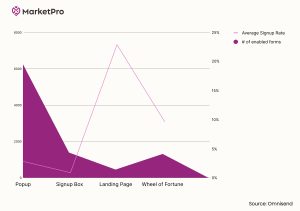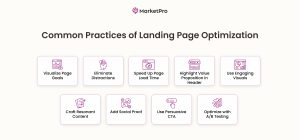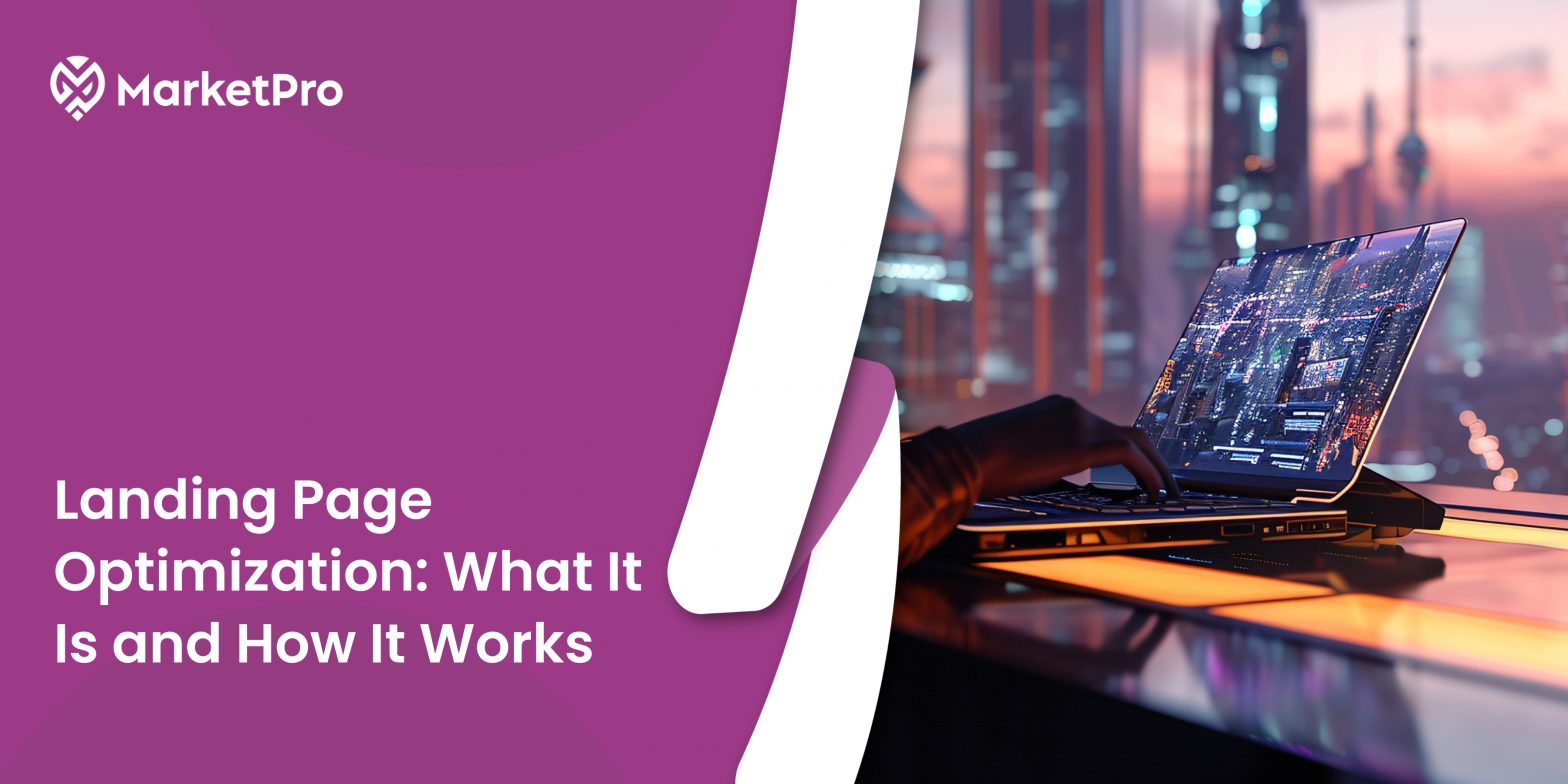Does your website face poor conversion rates because visitors leave without exploring further or taking meaningful actions? Or does lack of clarity and cluttered content make it difficult for your users to find what they need?
We’ve all been there.
Whether businesses aim to improve PPC campaign or conversion rates, a landing page is the key to turning clicks into customers.
This blog will serve as a guide to learning how landing page optimization can bring more leads and conversions to businesses.
What is a Landing Page Optimization?
Did you know that around 34% of marketers prioritize direct customer conversion?
Landing page optimization is the process of making strategic changes in web page elements to enhance user experience, driving more leads and conversions.
Optimization includes A/B testing of web page copies, call-to-actions and visual designs. It aims to elevate the user experience by making landing pages more persuasive, engaging and frictionless.
How Landing Page Optimization Make or Break Any Campaign Success?
A landing page is the backbone of any campaign success, whether for paid digital marketing campaigns or inbound traffic sources. Every business constantly searches to boost their sign-ups, lead forms, and micro-macro conversions.
The landing pages play a significant role in various conversion touchpoints. Its presence adds considerable value in terms of converting leads. Considering sign-up conversions, the landing page has the highest probability of earning sign-up rates compared to other forms like Popups or Signup boxes.
Below is the diagram showing the number of forms and average sign-up rates of different lead forms.

Optimizing landing pages is crucial for running the business conversion cycle. Marketers cannot allow weak CTA’s, slow page speed, and confusing content copy to miss their opportunity to convert customers.
The Anatomy of High-Converting Landing Page
Most websites face a hike in bounce rates due to their inefficient landing pages and damaged lead-to-conversion rates. To cope with these issues, here is a detailed checklist to optimize landing pages.
Visualize Your Page Goals
A landing page offers a valuable opportunity to capture customers’ attention and drive conversions. However, not all prospects arrive through paid campaigns, and inbound traffic sources can also direct visitors to your website. Without dedicated landing pages, mixed messaging like ‘20% off your first purchase’ and ‘Check out our new feature’ can confuse visitors.
As a result, creating a relevant and targeted landing page is essential which means one separate page for ads and email campaigns with a single goal, message, and call to action.

Remove Distractions and Navigation Links
B2B lead generation is a complex and complicated process, and landing pages are the building blocks of this procedure. A landing page should be frictionless, meaning it must eliminate any visual clutter and should not provide any on-page navigation to visitors.
Because the idea is to keep them focused and on track instead of giving them pathways to distract their attention. Any additional links will only give the visitors an excuse to procrastinate and give up right before taking action.
Improve Page Loading Time
Audiences’ attention spans are getting shorter and shorter, and a slow, laggy website adds nothing but more nuisance to their experience.
Moreover, Page load times are directly proportional to the bounce rate ratio. Research shows that pages taking 1 to 5 seconds to load can lead to a 90% increase in bounce rates.
Landing pages usually have high-resolution images and graphics that must be optimized with compressed files and sizes. All the multimedia elements residing on landing pages need to be reformed to ensure the fast and seamless speed of the landing page.
Clearly State Value Proposition in the Header
Did you know the average user’s attention span is less than a goldfish? Therefore putting all your energy into writing a copy rather than making a clear, concise and bold headline is surely a big miss for the landing page.
Focus on describing the value proposition in the headline at the top of the page because it’s the first thing visitors notice. It should be engaging and compelling enough to hook customers in and persuade them to read the rest of the copy.
Use Videos or High-Quality Visuals
Visual focus is one thing that separates ordinary landing pages from extraordinary. Where page headlines or header sections play a key role in grabbing the attention, visuals allow readers to keep them going. No matter the content quality, text and only text bores the readers out and ultimately harms businesses’ conversion goals.
Therefore, a quick product shot or bite-sized video of a product is always monumental to support the outcome of landing pages.
Create Content That Resonates
One of the traits of high-quality content in landing pages is that it speaks directly to customers and resonates with them. The idea of a landing page is to outline the benefits of products as a solution to their visitor’s potential problems.
Lead generation companies hire copywriters who have a knack for writing catchy and subtle copy that sparks curiosity yet sounds genuine in their tone. Benefits always overcome features; marketers must use exact figures and statistics to show how their product or service helps their past customers.
Visuals, multimedia, and videos are supportive elements, but high-quality and engaging content is the main lead performer of any personalized landing page.
Add Social Proof to Boost Impact
Social proof should be above the fold of every landing page. Its presence adds instant credibility to the value brands are promising. Landing page optimization ranks social proof as a minor deciding factor for conversions.
Brands can use customer or partner logos, verified badges, or specific real numbers to make their landing pages humanized and trustful.
Add Persuasive and Focused Call to Action
Landing page optimization ensures that brands use limited calls to action that create a sense of urgency among visitors. Many times, marketers overlook the opportunity to use one singular focused CTA and proceed to fill their landing pages with multiple call-to-action buttons.
However, while using multiple calls to action isn’t discouraged, a focused landing page remains key to maximizing checkout completions. Ensure your landing page clearly showcases its value proposition, outlines benefits, and includes social proof to address objections, leading ideally to a strong, single call-to-action button.
Instead of adding multiple call-to-action links to confuse visitors, landing page optimization focuses on placing a single, clear CTA above the fold.
A/B Testing of Landing Pages
Landing pages are not always promised to give the desired results. To improve business revenue marketing strategy, marketers need to conduct split testing of their landing pages to figure out the potential faults in their copies.
Most marketers use tools and heat maps to see the friction points on their landing pages. As a result, A/B testing will be conducted by creating different variants of landing pages to see which variations bring the desired results.
Marketers run experiments to create which version of the landing page’s headlines, visuals, forms, or CTA achieves the landing page’s overall preferred goals.
Amplify Your Growth with Landing Page Optimization
Landing pages allow businesses to complement their sales funnel goals by bringing sales-qualified leads to the sales department. Businesses invest their resources and budget in creating paid and organic marketing, which all lead to landing pages. Seeing their importance in the marketing and sales funnel, every marketer optimizes landing pages to bridge the gap between visitors and conversions.
Ready to level up your conversion growth? Partner with Market Pro’s experts to optimize your conversion-focused pages and see real results.

